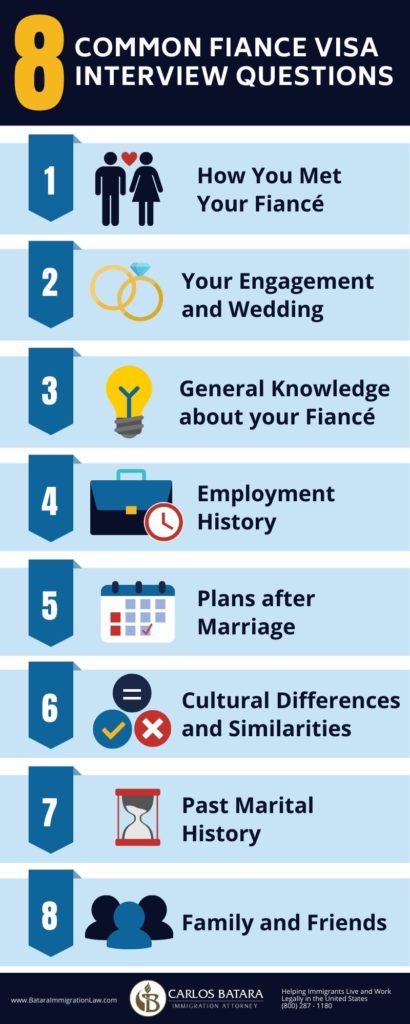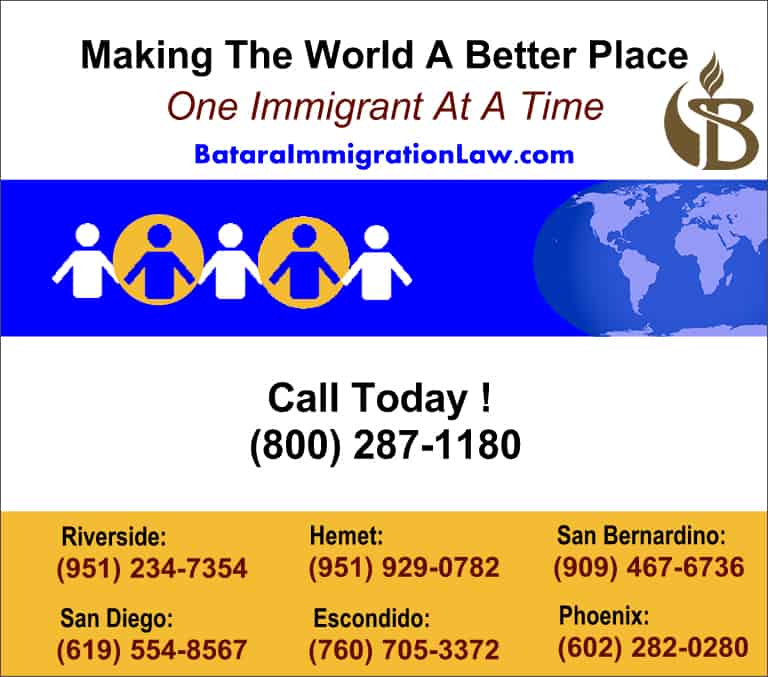
As a fiancé visa attorney, I’ve met far too many couples from different countries, hoping to spend their lives together, who take the K-1 visa interview process too lightly.
They think, “We’re legitimately in love so why worry?”
Not so fast.
Being in love, even deeply in love, is no guarantee of immigration success.
Love Happens . . . Then There’s Immigration
Sure, being in a legitimate relationship is the most essential component to winning the right to live together in the United States.
The government, however, will not assume the authenticity of a fiancé visa application simply because the couple completes the paperwork, files supporting documents, and pays the filing fees.
Because the granting of a fiancé visa, also known as a K-1 visa, enables an immigrant to enter the U.S. for the purpose of marriage within 90 days of entry – after which the foreign-born spouse becomes immediately eligible for permanent residency status – the immigrant is required to attend and pass an interview at a U.S. embassy abroad.
Like all immigration interviews, a fiancé visa interview can be a nerve-whacking and heart-pounding experience. A wide variety of questions can be asked at this meeting . Nothing is really off-limits.
How many varies from case-to-case. The interview might last 5 minutes, or 15, or 30. Or longer.
This leaves little room for error.
Hence, in this article, we’re going to explore what happens at a fiancé visa consulate interview abroad and provide insights about the types of questions the couple must be ready to address.
Ready to learn some K-1 visa interview tips?
Good.
Let’s get started.
A Few Preliminary Notes
To begin, we need to clarify the terminology. Both fiancé and fiancée are French words. The two words confuse many English speakers.
- Fiancé (with one “e”) is a man who is engaged to be married.
- Fiancée (with two “e’s”) is a woman who is engaged to be married.
For the sake of simplicity, we will use fiancé on this page to apply equally to both males and females engaged to be married.
Second, our examples are based on a male U.S. citizen who is planning to marry a female from another country. The roles are reversible. If your personal relationship is that of a female U.S. citizen and a male immigrant, the points addressed here are still fully valid.
Third, the K-1 visa interview is intended only for the foreign fiancé. Even though the U.S. citizen is allowed to go with his spouse-to-be for moral support, it is the immigrant who is the subject of the interview and must address the questions asked. Thus, this article is largely focused on the immigrant’s situation.
The Eight Most Common K-1 Interview Questions Faced By Couples Trying To Win Fiancé Visas (With Tips For Answering)
Even though the questions that might be asked are nearly limitless, there are eight areas of concern that government officers are likely to explore, almost without exception.
- How You Met Your Fiancé
- Your Engagement And Wedding
- General Knowledge About Your Fiancé
- Employment History
- Plans After Marriage
- Cultural Differences And Similarities
- Past Marital History
- Family And Friends
What you have to remember first and foremost is that a fiancé visa interview is really about preventing fraud.
Under the current administration, the U.S. government has taken on a more rigorous approach to interviewing individuals who are seeking any kind of immigration benefit.
A K-1 visa is on this hit list. The interviewing officers want to make sure whomever they give permission to enter the United States in the hopes of getting married is involved in a legitimate and real love relationship.
Further, they want to feel assured a marriage will soon follow.

Question 1. How Did You Meet Your Fiancé?
This is one of the first questions that will be asked. It may be probed through a series of related inquiries, such as did you meet online, through the internet via a dating service? Or did the U.S. fiancé go to the country of the immigrant fiancé on a vacation, company business, or to visit relatives who live in that country, at which time the two of you met?
Here are other questions that could be asked.
- How did you start corresponding with each other?
- How do you communicate now?
- How often do you correspond?
- How many times have you met in person, and where?
- What did you do together?
These types of questions shed important light on how you and your fiancé met and how the relationship developed.
The American visa consular officer will listen carefully to your answers. Be forthright and honest.
Question 2. Your Engagement And Wedding
At what point did you or your fiancé say, “I’d like to marry you.”? Or “I would like to marry you?” Or something similar.
This line of quizzing often takes place early in the fiancé visa interview, as it lays a foundation for the remainder of the process to ensure the person being questioned is involved in a legitimate love relationship.
Although this moment might be difficult to recall for older, long-time married couples, for folks who only recently fell in love, questions about that special event should be relatively easy to answer.
- When did the relationship turn romantic?
- Was it online and were there emails going back and forth and suddenly someone proposed?
- Or was it during one of the trips either to the immigrant fiancé’s country, or here in the United States?
- How did the wedding proposal happen?
- Was anybody else there, friends, family?
With a fiancé visa, when you enter the United States, you’re supposed to get married within 90 days.
Hence, questions about your wedding plans are also likely to be probed.
- Is the wedding celebration going to be in a hall, at a hotel, or at a home?
- Will the wedding be at a church or courthouse?
- Is the American fiancé going to engage in some type of pre-marriage ceremony in your home country before the marriage?
- Are your parents going to fly to the United States to be there for the wedding?
Question 3. General Knowledge
About Your Fiancé
A variety of general questions could possibly be asked to test how much you know about each other.
Here’s a practical hint.
When preparing for K-1 fiancé visa questions, don’t try to memorize answers word-for-word. It could cause you to feel confused and lead to a bad interview experience.
Based on several years of experience as an immigration lawyer in Riverside for K-1 fiancé visa applicants, I’ve learned many, many people crumble when their anxiety level goes up.
Allow me to explain.
When you try to memorize precise answers, it will impose increased stress on you at the fiancé visa interview appointment. Worse, you might sound like a robot to the officer asking questions.
If you take this approach, then you start to stumble, your nervousness will rise. This, in turn, could cause you to feel a sense of internal chaos and lead to giving jumbled replies to the questions posed to you.
Instead, talk to your future spouse ahead of time. Fill in the blanks what you don’t know, and if you are asked about such details, do your best to explain what you do recall to the U.S. consulate officer.
In my law practice, I also encourage to visualize the interview a few times before the interview. By actively imagining being under the government inquiry, your stress will usually be under greater control during the actual questioning.
Sincerity and authenticity counts at your K-1 fiancé visa interview.
Be genuine. Not a robot.
Here are some questions that might be asked regarding your future spouse:
- What’s his full name?
- Has he been married before?
- How long ago was he divorced?
- Does he have any brothers or sisters?
- What are his parents’ first names?
These are just general check-up issues that most legitimate couples would know about each other. As a result, they are very important to the success of your K-1 visa interview. They are subject to government interrogation because if you’re engaged in a truly serious relationship, common sense would seem to dictate you have likely shared this information about each other’s past.
Additional questions that might be asked are:
- What are your fiancé’s hobbies?
- What interests do the two of you share?
- Does your fiancé like going to watch movies or plays?
- Is your fiancé a member of any political, social, or religious organizations?
- Does your fiancé play any sports?
I’m pretty sure you have exchanged some information about things like these during your time together. This type of knowledge is quite common for most couples. Of course, you probably never suspected such inquiries are ripe for questioning at your K-1 interview.

Question 4. Employment History
You might be asked about your American fiancé‘s history of employment at your fiancé visa interview.
Types of questions will be like:
- Do you know where he works?
- Do you know his salary?
- What are his career goals?
- Did he attend college or obtain specialized training?
- What days and times does your fiancé go to work?
The same line of questions could be asked of the immigrant.
For instance, the government agent may decide to inquire whether the immigrant fiancé went to college. Does the immigrant fiancé have a career in her home country that she is giving up?
Question 5. What Are Your
Plans After Marriage?
The questions about employment flow naturally into interrogatories about life after marriage.
Some typical questions are listed below:
- Does the fiancé need to improve her English-speaking ability?
- If it’s not quite that strong when she arrives, does she plan to go to school here and improve her written and spoken fluency?
- Does the fiancé plan to work in the United States?
- If the fiancé was college educated in her country, will she seek to study advanced courses here?
Some couples are not going to have a lot of specific details. Still, general details are ripe for questioning. For instance, perhaps the U.S. citizen has an uncle that owns a company, and he’s going to employ his nephew’s fiancé once she receives work authorization
Maybe the consulate officer will inquire about the long-term career plans not just of the immigrant fiancé, but also of the U.S. citizen. Have the two of you talked about such goals? What are your employment dreams five years from now, 10 years from now, 15 years from now?
In other words, what happens after your interview, assuming your K-1 visa petition is approved, is a relevant line of inquiry by the embassy agent.
Here’s a quick tip.
This is a good line of questioning to help you prepare for your fiancé visa interview. To the extent you’re prepared to share your goals for the future, the more likely you’ll be ready to address almost all categories of government inquisition.
Question 6. Issues Of Culture:
Differences And Similarities
This category is one of the most obvious areas for heightened scrutiny. The government official is going to take a deep look at what similarities as well as what differences you and your intended spouse may have culture-wise.
When it comes to cultural differences, the further apart you are, the more likely suspicions will arise regarding whether your relationship is built on a good faith basis.
As mentioned earlier, a foremost purpose of the fiancé visa interview is to make sure your K-1 application is based on a real, genuine, bona fide, legitimate marriage – and not just a fly-by-night scheme being done for money or on a pretense of love that enables the U.S. citizen to bring a short-term companion to the United States.
That’s what questions about culture are geared to reveal.
Sometimes, individuals from the U.S. have their ethnic roots and family ties in another country. Maybe that led to how the couple met. Perhaps the United States citizen went to his parent’s country of origin to visit a cousin, an uncle, or a grandparent, and while there, met the love of their life.
In such instances, cultural differences are usually minimal.
What about language?
The interviewing officer may ask how a couple communicates. It is not just a matter whether a couple communicates by email or Skype or Google Hangouts. How do they communicate language-wise?
Do the parties speak each other’s language? Does the immigrant spouse speak English, or does the United States soon-to-be spouse speak the immigrant’s native language?
Some typical questions are:
- What is your primary language?
- What is your fiancé primary language?
- What other language(s) do you speak?
- What other language(s) does your fiancé speak?
These are, in reality, common sense questions.
How about religious beliefs?
Do you and your fiancé share religious beliefs, or do you have different religious beliefs?
What is one person is a devout Christian, the other is a Muslim? What are the plans for sharing each other’s beliefs? How is this going to impact the wedding ceremony?
Cultural differences often lead to dietary differences. If so, how is the couple planning to deal with such differences on a day-to-day basis?
In a fiancé visa interview, culture is a big area. It’s a BIG area of review because the wider the differences, the more reasons will exist for a consulate officer to assume a distrusting posture toward the relationship.
Question 7. Past Marital History
Do you recall that it is the immigrant fiancé that is being questioned?
This doesn’t mean questions about the United States fiancé are off-limits. In fact, the opposite is more the rule, than then exception.
Accordingly, here some basic questions which might be asked about the past marital history of the U.S. citizen fiancé.
- Has the American fiancé been previously married?
- How many times has he been married?
- What are his ex-spouses’ names?
- When did he get a divorce?
- Does he have any children?
That’s the mere tip of the iceberg. Much deeper questions can be asked.
Suppose the U.S. citizen has children has children from an earlier marriage.
The interview agent might inquire, for example, if the immigrant fiancé has visited the love of her life in the United States, was she introduced to the U.S. citizen’s children from his earlier marriages? And if not, why not, and if so, how did that meeting go?
Does the American fiancé have custody or visitation rights with his children? Will the children live with the couple, either permanently or on the weekends and during school vacations? Are the children accepting of having a step-mother in their lives?
On the other hand, similar questions can be asked the other way.
Has the immigrant fiancé shared confidences with her intended husband about previous marriages? Does she have children? What are the couple’s plans for her children? Are they part of the fiancé visa application, as K-2 dependents, or are they remaining in their homeland? What’s the rationale behind this decision?
Grab Your Copy Of Our Comprehensive K-1 Interview Questions Guide
Question 8. Family And Friends
Akin to questions about marital history, immigrant agent inquiries centered on knowledge about each other’s family and friends provides insight into the degree of sharing between the couple.
In short, how much does the fiancé from another country know about the best friends and relatives of the U.S. fiancé? Conversely, how much does the U.S. citizen know about his fiancé’s family members and close friends?
For instance, assuming the U.S. citizen has visited his fiancé in her native country to spend some time together, did he meet her parents? How did he get along with them? If he did not meet them, why not?
Are the immigrant fiancé’s parents accepting of the relationship? What do they think about her moving far away?
What about brothers and sisters of the immigrant fiancé? Were they introduced to her future husband? Did they hang out together? Did they go out to the movies together? Did they go to restaurants together?
Did everyone get along? Are they accepting of the relationship?
If the immigrant fiancé came to the United States, was she introduced to her future husband’s best friends, coworkers, parents, brothers, sisters, uncles, aunts, and neighbors?
A series of questions could revolve around the following:
- What are your fiance’s parent’s names?
- Have you met your fiance’s parents?
- Why or why not?
- Where do your fiance’s parents live?
- Have you met any of your fiancé’s friends?
- If so, who?
Some couples think these questions are intrusive or unnecessary. Not so. These types of questions are extremely relevant in the effort to weed out immigration fraud.
These questions are an important indicator of a bona fide romance. Your straight-forward answers could be crucial to helping avoid having your fiancé visa denied.
Has the relationship evolved to the point that both parties know a good deal about each other? Have they introduced the other person to those who are closest to them?
In a normal relationship, such behavior is common. The presence or absence of these interactions are appropriate subjects for examination by consular officers prior to granting a visa.
Be aware that one set of questions, depending on the answers, could open up a new line of scrutiny.
Officers who explore meetings with the friends or relatives of the U.S. citizen could easily glide over to assessing the travel history of the immigrant fiancé.
Has she ever visited the U.S. in the past, even before she met her soon-to-be husband? Did she comply with the terms of her previous tourist visas?
Since a fiancé is seeking a legal entry to the U.S., the American government will nearly always assess her travel record carefully to make sure there are no violations of the terms of her previous short-term visas.
Here’s the key take-away. When you go to a fiancé visa interview, you need to be prepared for a wide range of questions.
Conclusion: Don’t Underestimate
The K-1 Visa Interview Process
In closing, I want to again point out that it is impossible to think of every possible question which might surface. But if you prepare along the lines of the categories outlined here, you will have taken a major step forward to success.
To recap, as part of your preparation, be sure to think closely about:
- How You Met Your Fiancé
- Your Engagement And Wedding
- General Knowledge About Your Fiancé
- Employment History
- Plans After Marriage
- Cultural Differences And Similarities
- Past Marital History
- Family And Friends
If you would like more examples regarding what you might be asked, download our free fiancé visa interview questions checklist. It shares 180+ potential questions for you to think about before your big day.
I also want to re-emphasize you should not try to memorize your answers and sound like a robot. Instead, take enough time in advance to remember details about broad categories you are most likely to be queried about. And on the day of your interview, provide good, sincere, and honest responses.
Our K-1 visa interview questions checklist can help you. But you and your fiancé, alone, can do the work necessary for success.
By getting ready ahead of time, if something is a little fuzzy, talk to your fiancé about it. Like this. “When we went to see that play on my birthday, what was the name of the hotel we stayed at? How much were the tickets? Oh yeah, what was the name of the play?”
As I noted at the outset, I’ve met too many couples from different countries, hoping to spend their lives together, who take the K-1 visa interview process too lightly.
Since you’ve read this far, I doubt you’re one of them.
Now get to studying and make your dreams come true.
If you’re thinking about bringing your fiancé to the United States, and you’re serious about discovering how to win a K-1 visa . . .
Let’s schedule your Strategy And Planning Session today.




